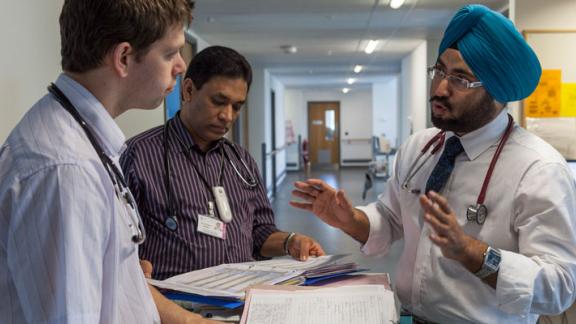NHS Employers' evidence to DDRB 2023/24

The independent review body on doctors' and dentists' remuneration makes recommendations to the government on pay awards for medical and dental staff. NHS Employers submits evidence to the DDRB, based on information collected from our engagement activities with employers in England. Final decisions on pay awards are made by the government.
We have published our 2023/24 written evidence to the DDRB. This is based on feedback collected from employers during an extensive period of engagement following our 2022/23 submission.
It principally covers doctors in training, specialty and specialist (SAS) doctors, consultants and salaried primary care dentists, but also considers the position of locally employed doctors (LEDs) and the treatment of closed national grades.
Our submission includes:
- information about maintenance of the junior doctor contract following the 2019 framework agreement
- an update on the implementation and take up of the new specialty doctor and specialist contracts
- an update on progressing Local Clinical Excellence Awards (LCEAs) successor scheme arrangements from 2022/23
- information about the recruitment, retention and morale of salaried primary care dentists
- information on pensions and reward.
Key messages
- Employers are currently experiencing exceptional workforce challenges. While there has been an increase in the numbers of doctors and dentists in the year to July 2022 (2.8%), vacancy rates have also continued to grow and the number of leavers are in excess of 20,000. These high vacancy rates have impacted on service provision as employers cover vacant posts with agency locums and other temporary staff, which comes with significant financial impact. It can also create challenges in ensuring continuity of care.
- For the NHS to fully recover from the pandemic, tackle its waiting lists and support its staff, it will need the government to provide investment for an ambitious long-term plan for the workforce.
- There has been lower investment in the medical paybill relative to other staff over the last 12 years. Long term contractual agreements have meant lower pay awards in some cases, and there are taxation issues related to pensions that undermine the value of the total reward package for some senior clinicians.
- There is a worsening position on health and wellbeing measures across all occupation groups. The overall staff engagement indicator has declined for the first time in three years. This was driven largely by the reduction in the percentage of staff willing to recommend the NHS as a place to work, and reductions in most indicators of staff motivation and staff involvement, which are the other elements of the staff engagement indicator.
- Employers want to see a pay award that is fully funded and sustainable, allowing them to continue to prioritise workforce growth in key areas.
- It is important to bring the timetable of the pay review body back to normal, enabling a return to prompt implementation and payment of pay awards to staff.



